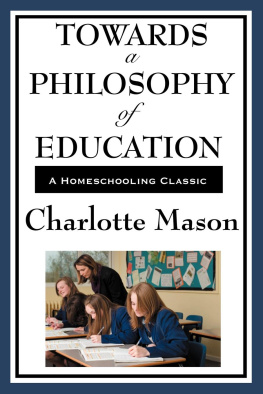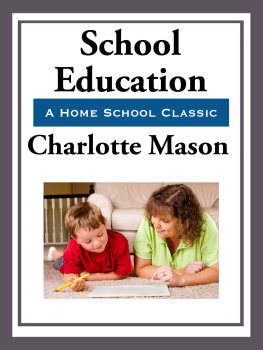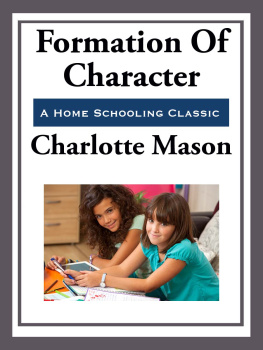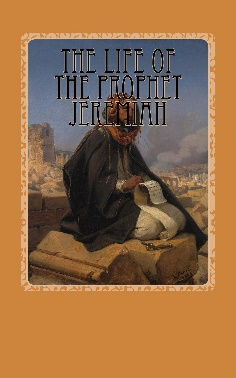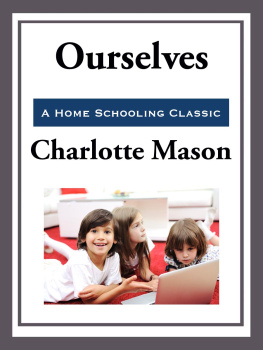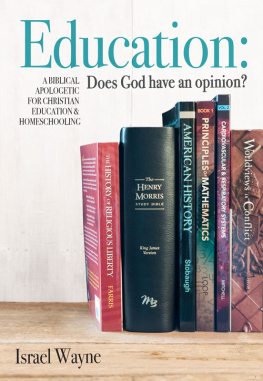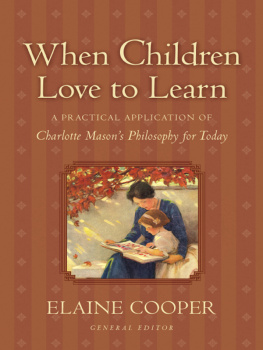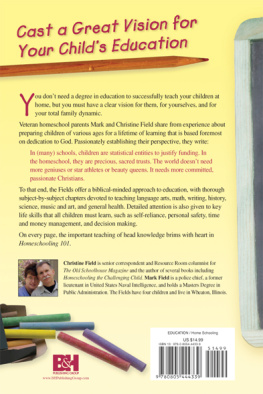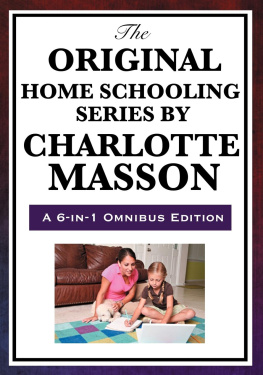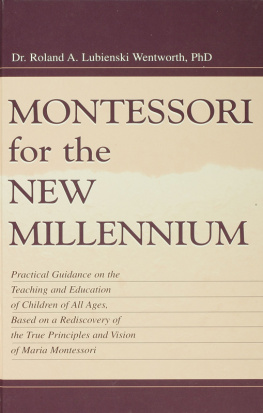Towards A Philosophy Of Education
By Charlotte Mason
Start Publishing LLC
Copyright 2012 by Start Publishing LLC
All rights reserved, including the right to reproduce this book or portions thereof in any form whatsoever.
First Start Publishing eBook edition October 2012
Start Publishing is a registered trademark of Start Publishing LLC
Manufactured in the United States of America
10 9 8 7 6 5 4 3 2 1
ISBN 978-1-62793-288-2
Authors Preface
It would seem a far cry from Undine to a liberal education but there is a point of contact between the two; a soul awoke within a water-sprite at the touch of love; so, I have to tell of the awakening of a general soul at the touch of knowledge. Eight years ago the soul of a class of children in a mining village school awoke simultaneously at this magic touch and has remained awake. We know that religion can awaken souls, that love makes a new man, that the call of a vocation may do it, and in the age of the Renaissance, mens souls, the general soul, awoke to knowledge: but this appeal rarely reaches the modern soul; and, notwithstanding the pleasantness attending lessons and marks in all our schools, I believe the ardour for knowledge in the children of this mining village is a phenomenon that indicates new possibilities. Already many thousands of the children of the Empire had experienced this intellectual conversion, but they were the children of educated persons. To find that the children of a mining population were equally responsive seemed to open a new hope for the world. It may be that the souls of all children are waiting for the call of knowledge to awaken them to delightful living.
This is how the late Mrs. Francis Steinthal, who was the happy instigator of the movement in Council Schools, wrote,Think of the meaning of this in the lives of the children,disciplined lives, and no lawless strikes, justice, an end to class warfare, developed intellects, and no market for trashy and corrupt literature! We shall, or rather they will, live in a redeemed world. This was written in a moment of enthusiasm on hearing that a certain County Council had accepted a scheme of work for this pioneer school; enthusiasm sees in advance the fields white to the harvest, but indeed the event is likely to justify high expectations. Though less than nine years have passed since that pioneer school made the bold attempt, already many thousands of children working under numerous County Councils are finding that Studies serve for delight.
No doubt children are well taught and happy in their lessons as things are, and this was specially true of the school in question; yet both teachers and children find an immeasurable difference between the casual interest roused by marks, pleasing oral lessons and other school devices, and the sort of steady avidity for knowledge that comes with the awakened soul. The children have converted the school inspectors: And the English! said one of these in astonishment as he listened to their long, graphic, dramatic narrations of what they had heard. During the last thirty years we (including many fellow workers) have had thousands of children, in our schoolrooms, home and other, working on the lines of Dean Colets prayer for St Pauls School,Pray for the children to prosper in good life and good literature; probably all children so taught grow up with such principles and pursuits as make for happy and useful citizenship.
I should like to add that we have no axe to grind. The public good is our aim; and the methods proposed are applicable in any school. My object in offering this volume to the public is to urge upon all who are concerned with education a few salient principles which are generally either unknown or disregarded; and a few methods which, like that bathing in Jordan, are too simple to commend themselves to the general. Yet these principles and methods make education entirely effectual.
I should like to add that no statement that I have advanced in the following volume rests upon opinion only. Every point has been proved in thousands of instances, and the method may be seen at work in many schools, large and small, Elementary and Secondary.
I have to beg the patience of the reader who is asked to approach the one terminus by various avenues, and I cannot do so better than in the words of old Fuller:Good reader. I suspect I may have written some things twice; if not in the same words yet in sense, which I desire you to pass by favourably, forasmuch as you may well think, it was difficult and a dull thing for me in so great a number of independent sentences to find out the repetitions... Besides the pains, such a search would cost me more time than I can afford it; for my glass of life running now low, I must not suffer one sand to fall in waste nor suffer one minute in picking of straws... But to conclude this, since in matters of advice, Precept must be upon Precept, Line upon Line, I apologise in the words of St. Paul, To write the same things to you to me indeed is not grievous, but for you it is safe.
I am unwilling to close what is probably the last preface I shall be called upon to write without a very grateful recognition of the co-operation of those friends who are working with me in what seems to us a great cause. The Parents National Educational Union has fulfilled its mission, as declared in its first prospectus, nobly and generously. The Union exists for the benefit of parents and teachers of all classes; and; for the last eight years it has undertaken the labour and expense of an energetic propaganda on behalf of Elementary Schools, of which about 150 are now working on the programmes of the Parents Union School. During the last year a pleasing and hopeful development has taken place under the auspices of the Hon. Mrs. Franklin. It was suggested to the Head of a London County Council School to form an association of the parents of the children in that school, offering them certain advantages and requiring a small payment to cover expenses. At the first meeting one of the fathers present got up and said that he was greatly disappointed. He had expected to see some three hundred parents and there were only about sixty present! The promoters of the meeting were, however, well pleased to see the sixty, most of whom became members of the Parents Association, and the work goes on with spirit.
We are deeply indebted to many fellow-workers, but not even that very courteous gentleman who once wrote a letter to the Romans could make suitable acknowledgments to all of those to whom we owe the success of a movement the rational of which I attempt to make clear in the following pages.
Charlotte M. Mason,
House of Education Ambleside. 1922
A Short Synopsis
Of the Educational Philosophy Advanced in this Volume
No sooner doth the truth .....come into the souls sight, but the soul knows her to be her first and old acquaintance.
The consequence of truth is great; therefore the judgment of it must not be negligent. (Whichcote).
1. Children are born persons.
2. They are not born either good or bad, but with possibilities for good and for evil.
3. The principles of authority on the one hand, and of obedience on the other, are natural, necessary and fundamental; but
4. These principles are limited by the respect due to the personality of children, which must not be encroached upon whether by the direct use of fear or love, suggestion or influence, or by undue play upon any one natural desire.
5. Therefore, we are limited to three educational instrumentsthe atmosphere of environment, the discipline of habit, and the presentation of living ideas. The P.N.E.U. Motto is: Education is an atmosphere, a discipline, and a life.
6. When we say that education is an atmosphere, we do not mean that a child should be isolated in what may be called a child-environment especially adapted and prepared, but that we should take into account the educational value of his natural home atmosphere, both as regards persons and things, and should let him live freely among his proper conditions. It stultifies a child to bring down his world to the childs level.

